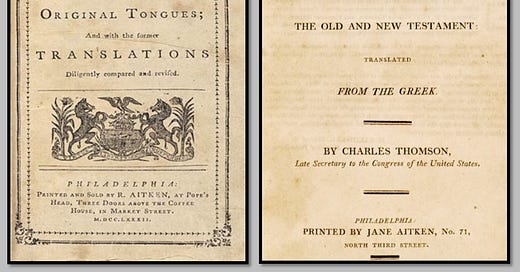TDIH: Aitken's Bible
Who knew that one consequence of the American Revolution would be a shortage of Bibles?
On this day in 1782, the Continental Congress recommends a Bible to the residents of the United States. This particular translation was created because Americans were having so much trouble obtaining Bibles during the American Revolution.
Before the war, Americans obtained their Bibles from England. At the time, there was no American translation and no one to publish Bibles on this side of the ocean. Thus, you can imagine that, once the war started, it became very difficult to obtain a Bible.
Who knew that one consequence of the war would be a shortage of Bibles?
On September 11, 1777, the matter came before the Continental Congress. A committee reported that “the proper types [of printers] for printing the Bible are not to be had in this country, and that the paper cannot be procured.” The problem was deemed a great one because “the use of the Bible is so universal, and its importance so great.” The committee recommended that Congress “import 20,000 Bibles from Holland, Scotland, or elsewhere.”
In the meantime, one respected publisher in Philadelphia decided that something must be done. Robert Aitken notified Congress on January 21, 1781, that he would be working on an American translation of the Bible. He asked that his work be “published under the Authority of Congress.” Congress appointed a committee and stayed in touch with Aitken about his project. When the translation was complete, two congressional chaplains reviewed the work.
On September 12, 1782, Congress decided to endorse the Bible, noting that it “highly approve[s] the pious and laudable undertakings of Mr. Aitken . . . [and] recommend[s] this edition of the Bible to the inhabitants of the United States.” Aitken’s Bible was the only Bible to receive such an official sanction in America.
The timing was unfortunate for Aitken. By then, the war was wrapping up and it once again became easier to acquire Bibles from overseas. Aitken was unable to recoup his costs from the project.
The following year, one Reverend had an idea. What if Congress were to present each soldier with one of Aitken’s Bibles? He wrote George Washington about the project. Washington thought the idea was a good one, but that the timing was wrong. “[I]t is now too late to make the Attempt,” Washington wrote, but “[i]t would have pleased me, if Congress should have made such an important present, to the brave fellows, who have done so much for the Security of their Country’s Rights and Establishment.”
When Aitken died, he left his business to his daughter. Jane Aitken may be best known for publishing the four-volume Thomson Bible, which was prepared by Charles Thomson, former secretary of the Continental Congress.
Very odd history if our Founders actually were deists who wanted to build a wall of separation between church and state, as some would have us believe.
Sources can always be found on my website, here.





The "Separation of church and state" concept was clearly intended to prevent interference in the church by the state; freedom OF religion, NOT from it.
Great last paragraph! The separation of. Church and State does not exist in the Constitution. It was a letter Jefferson wrote to a church.